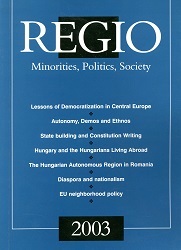Diaspora and Nationalism: An Anthropological Approach to the International Romani Movement
Diaspora and Nationalism: An Anthropological Approach to the International Romani Movement
Author(s): László FosztóSubject(s): Social Sciences
Published by: MTA Társadalomtudományi Kutatóközpont Kisebbsegkutató Intézet
Keywords: Roma; diaspora; nationalism; Eastern Europe
Summary/Abstract: The study presents a sketch of international Roma politics, concentrating on recent developments and suggests an anthropological interpretation of the emergence and maintenance of the social formation called “Romani movement”. The example of the Romani movement can offer some theoretical and methodological conclusions that could contribute to better understanding of relations between diaspora and nationalism and could direct the attention of analysts to the role of the institutions at the supra-state level in building and maintaining collective identities. The opportunities and limitations of Roma politics are framed by the general political transition of the region. The problems of democratization or nationalization of Eastern European states, and the process of European Union enlargement raise problems that seek solutions for both majorities and minorities (including the Roma) of these states. In addition to reconfiguring political hegemonies, transformation and development impose problems on the welfare and social systems of the region. Roma are among the most disadvantaged groups struck by unemployment and poverty. The fear of a possible mass migration from Eastern Europe to western countries is again and again raised in political forums. In this way the eastern part of the continent is perceived as a source of treat.
Journal: Regio - Minorities, Politics, Society - English Edition
- Issue Year: VI/2003
- Issue No: 1
- Page Range: 102-120
- Page Count: 19
- Language: English

